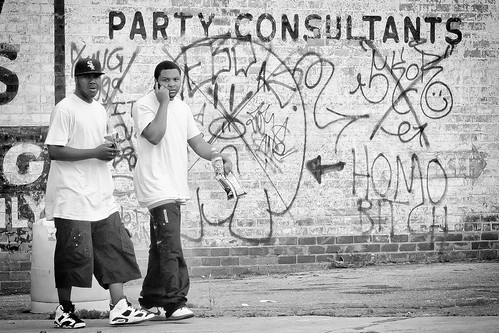I’m A Consultant – I Don’t Want Your Job & Other Thoughts
Posted by Mitch Mitchell on Dec 28, 2015
A few years ago I was talking to another health care consultant about the difficulties we sometimes have marketing in health care. He had a ready made answer for me, something that came out of left field.
What he said was "They're scared to talk to you because they think you want their job." I was stunned by that, but he continued telling me a few other things I'd never thought about before.
 |
When I was a director, I reported to the position of chief financial officer or vice president of finance. I always knew there were things I knew that they didn't, but I always figured that there were things they knew that I didn't. It never occurred to me at the time that anyone would ever think that I wanted their job because I enjoyed what I was doing. Even as a consultant, until this guy said what he said, it had never been on my mind that someone would ever think I wanted their job.
As I thought about it after our conversation, I wrote down some thoughts that I believe are important to talk about, some that go beyond consulting. The first one I've already mentioned, but we're going to go further with it.
A. Everyone needs to know you're not out for their job
So everyone really does need to know that I'm not out for their job, and other consultants aren't out for your job. It actually goes further than this.
What my friend also said was that, because he was also in the business of working with the same folks but in a different capacity, a lot of them worried that he would make them look bad because he could provides successes and results that they couldn't. He said the same thing about what I do.
It's not that we're smarter; it's just that we are more directed at the things we know and do than what most C-level professionals actually get to do. It only makes sense in all industries that there would be those who knows things they don't know better than they do. However, seeing it in terms of being worried about losing their job... that makes no sense at all.
B. You need to know that you're still evaluating others & their competency
If you're a consultant, one of the things you do is evaluate how things are because you can't fix anything or help to make any changes without doing so. If there's no evaluation, then everything is just a guess and nothing positive can be addressed.
Consultant's also evaluate everyone involved, which includes the people in charge. They need to know if whatever they suggest is something that everyone else is capable of doing or interested in doing. Not to do so means nothing positive will happen, and it's the consultant that's going to take the blame.
This one is also a leadership responsibility. Leaders who don't evaluate the people they work with are headed towards doom, and when they take the blame it sometimes costs them their job.
 |
C. Ask probing questions, then let others do the talking
Consultant ask a lot of questions. What's not generally known is that at least half the time consultant already know the answers. I can go into a meeting with the department director pretty much knowing what they're going to say to of the questions I'm going to ask. What I'm doing is listening to when they say something that doesn't fit what I'm expecting, which happens a lot.
During that time, I'm not talking all that much. It's not that I'm not trying to give something away. I want to make sure I understand what's going on because I can't be effective if I don't pay attention. If all is good, it's actually great. If it's not... that can sometimes be great also.
Sometimes people looking for answers talk too much. It's not always about what you know; when you ask questions, it's about what others know or don't know.
D. Explain basic principles when needed & benefits
When it's time to make change, sometimes consultants start at the beginning to explain what's going on before getting to the rest of it. It's never smart to assume that the people we're talking to already knows what we're talking about. I've found that assuming people know things is when trouble begins. For instance, many procedures I've read written by others leaves steps out, which makes for a lot of confused employees.
E. If you don't know the answers, don't fake it
One of the best things I ever had said to me was when a supervisor at a site I was consulting at told me I wasn't like other consultants she'd met because I wasn't afraid to say there were things I didn't know. Any consultant who tells people things without being totally sure is going to be trouble.
The only guarantee I've ever made to a client is that things will be better after I've done what I do. I may know after a few hours whether the successes are going to be big or small, but if I'm asked for a specific number I'm never going to give them one.
If I don't know the answer, or I want to verify the answer before I give it, I'm probably going to tell you that or I'm going to defer giving the answer until I do some research. I always figure my credibility as a consultant is on the line and that everybody would prefer that I give proper answers rather than guess at things that I could be wrong on later down the road.
I know too many authority figures that feel they're supposed to know everything, thus gives wrong information out. Sometimes they'll own up to it later, but most of the time they'll work hard to find ways to justify why they gave a particular answer. That wastes time and generates mistrust; it's better not to say anything at all.
 |
F. Never let an unanswered question remain that way for long
Sometimes an issue or question is one that will require major research. Sometimes a hard question is easy to answer but involves people and answers you'd rather not give.
The best reasons for having a consultant around is that, because there's no emotional attachment or a political motivation behind them, you can get true responses without having to worry about the long-term consequences or someone having an agenda. However, consultants are human, and sometimes they're hesitant to answer questions because they fear it might usher them out of an assignment sooner than they're ready for. Things like having to tell the person who hired them that the reason there are so many problems is because of them; that can be a tough one. However, a good consultant is going to tell you, hopefully sooner than later.
Hired leaders need to do the same type of thing. If it's a hard answer, they need to figure out how to deliver it truthfully and quickly. If it's easy and it's not addressed... get out of leadership immediately because you're probably never going to be all that effective.
G. You need to know when to step forward & lead
Although I'm telling this from the point of view of a consultant, this is a leadership lesson for everybody.
There are times when you go in as a consultant and you realize that you're the only one in the room who knows what has to take place to get things fixed. Even if you're not officially the person in charge, you know that if you don't take charge nothing positive is going to happen.
I have found in all my years that quite often the most talented person in the room is the one who's actually doing the work on a daily basis. Many times directors might have been the talented ones, but when you become a director you're not always doing the work and things change, including knowledge and skill. It makes sense that there would be times where a person who's not in a leadership position should take the lead on something.
Nobody, whether it's a person in charge officially or consultant, should ever feel that their pride is more important than getting things done properly. Remember, it's not always about the leader's feelings.
H. You won't be perfect either; just be the best you can
Nobody is perfect. The CFO isn't perfect, the CEO isn't perfect, a director isn't perfect, employees aren't perfect... Therefore, consultants aren't perfect either. The best anyone can ever hope for is it someone is giving them their best.
When it comes to most consultants, if they're actually giving you something that you can use, it's usually pretty good advice. I say that as someone who's been on the other side and had to deal with consultants who only pointed out problems that I already knew about and offered no solutions. I had always promised that if I ever became a consultant I would be someone who would at least try to offer solutions to the biggest problems a client has.
Sometimes you can't fix everything, but if we go by the Pareto Principle, we can probably make some major changes by addressing a few of the worst things that are out there. This isn't only for consultants; it's for everybody, in business and life.
Those are my thoughts; what do you think?

